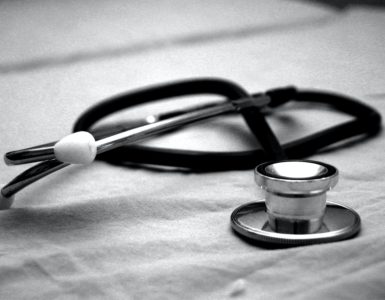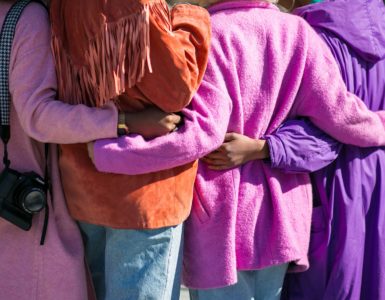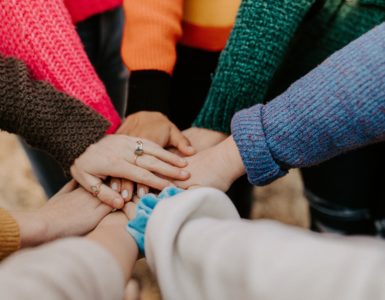As part of our own personal agency’s suggested to-dos before bringing our newly adopted child home, they suggested that we find a pediatrician and chat with them while we were waiting for court. Since we found a pediatrician we loved prior to having biological children, we knew we were already set in terms of a primary care provider for our adopted child. Before having any children, we made sure to seek out a pediatrician that was “adoption-aware,” especially on international terms, since we knew we would eventually adopt overseas. This made our son’s transition to American life even easier; we had an already established baseline of health expectations for our family with our current provider. We found this to be an invaluable asset in our parenting arsenal. Years later, we absolutely understand why our agency suggested we interview pediatricians early on – having an adoption-aware pediatrician matters.
As we were seeking out a reputable pediatrician for our family, we were looking specifically for someone who was “internationally aware” alongside being “adoption-aware.” We wanted someone who not only knew about trauma, deregulation, typical delays seen in children from hard places, good referrals for specialists, and abuse markers. We also wanted someone who would be familiar with more internationally seen issues, like parasites, gut infections, botched surgeries, scarring, and severe malnourishment. Things that aren’t often seen here in the states can be new or confusing to a medical professional who isn’t versed in overseas care (or lack thereof). We needed a doctor who would think things like, “Okay, so your child is vomiting after eating. Let’s make sure we rule out H. Pylori,” something often seen in children coming from other countries. We needed the creativity and out-of-the-box thinking required when dealing with our children from other countries.
Prior to adoption, you can utilize an adoption-aware pediatrician to help you navigate the “special needs” diagnosis list that your agency will give you ahead of time. Knowing what your family is capable of handling can be critical as you wait for a government to find you a match. The list given is long and overwhelming, but having someone walk alongside and explain each and every diagnosis listed will help you have a better idea of what your family can grow to. Once that match is found, prospective adoptive parents will obtain medical files, including possible psychological reports. You can then take these into a pediatrician to look over and help you discern what your potential child may be dealing with. Many of those forms and reports use jargon that may be difficult to analyze without a medical professional.
For instance, our son’s medical report labeled him as “bilaterally and profoundly deaf,” meaning that he had lost the majority of his hearing in both ears. As a sign language interpreter, this was my cup of tea. Later, after having an audiology friend read a different report we got later, we found out that he had a temporary loss of hearing in one ear due to infection scarring and that hearing would most likely be restored once tubes were in place. So, he wasn’t deaf at all. But without reaching out to a medical professional, we would not have been able to understand the differences in the various reporting. Oftentimes, these reports are incorrect or incomplete, so having a professional take a second look will help stack the deck in your favor in terms of understanding potential future encounters.
Having an adoption-aware pediatrician is critical to help you maintain safety within your own home as you sort out all of your newly adopted child’s medical issues. For instance, having a pediatrician who knows about issues you may encounter on your pick-up trip is immensely helpful during your preparation. Knowing that the likelihood that your child from Eastern Europe will have parasites and worms is high makes it crucial that you don’t bathe anyone with your new child. That is very important to the health of everyone else in the home.
Getting rid of parasites is tough enough; you certainly do not want those being passed around! But the average parent, especially one who is adopting for the first time, doesn’t know these types of things. Why would you? If you’ve never gotten a parasite from dirty water, why would you expect to need to protect other family members from it? Having a professional in your corner with unique adoption experiences will be a huge benefit to you before, during, and after you bring your child home.
During our international stay, we had an unexpected problem come up. We were overseas in Eastern Europe picking up our new son. He was three years old, but developmentally and physically significantly smaller than his chronological age. We also brought along our two-year-old (who turned two on the airplane going over) and our six-month-old. But don’t worry – we brought along my parents because we knew this would be a disastrous two weeks without support! We had already picked up our new son and were waiting for our upcoming embassy appointment back at our rented, capital city apartment.
We didn’t do much throughout the waiting days; nothing more than eating, playing, and attempting to combat jetlag with three little ones. During one of those waiting days, our biological two-year-old developed some odd symptoms. Along with a low-grade fever, she started wheezing and was noticeably out of breath after just a few steps. This was very different than her usual. We brought the normal medicine that is suggested to bring overseas with you when you travel for pick-up like Motrin and Benedryl, but those were not helping her breathing issues. Since my husband has severe asthma, we have been ready and waiting for the moment one of our biological children struggled with difficulty breathing. But we were hoping this moment wouldn’t be while we were out of the country!
Our only resource left, since we did not trust the foreign hospital system in-country, was to wait for our pediatrician’s office to open and call in for help. We waited for the seven-hour time difference to pass, and then called right at opening. Our pediatrician called our rented cell phone back a few minutes later with a plan. She proceeded to tell us a variety of vitamins and supplements that could be easily found in an overseas pharmacy where medical access is difficult to acquire. Our daughter was back to her active, normally breathing self within four hours.
Our pediatrician saved us from a very scary medical hospital stay that day. If she had not been knowledgeable about pharmaceutical availability overseas and ways to overcome ailments in a creative way (without prescriptions or well-known, over-the-counter medication), we would have had a significantly worse experience in-country. Having an adoption-aware pediatrician has been invaluable to us, even in a unique way that didn’t involve our adopted child.
Having an adoption-aware pediatrician also helps stack the deck in terms of medical compassion. Adoption-aware physicians know the various experiences your child may have encountered, from malnourishment to physical abuse and everything in-between. There is a level of compassion that comes with having seen the horrors of adoption. This compassion will help your family immensely, especially while you are busy falling down the rabbit holes of unknown medical histories and weird, unsearchable (Internet-wise) symptoms.
An adoption-aware, compassionate medical provider will want to help solve the dark mysteries that lie in your child’s history. A compassionate physician will know the techniques needed to acquire certain information from tests, like how to help a child who has experienced medical abuse in their home country get through a blood draw successfully. An adoption-aware pediatrician naturally has a level of compassion not always found in the mainstream medical world.
I’m sure most parents of neurotypical children have filled out the autism form for their child’s two-year-old checkup. It’s a quick list geared to help early intervention for autism and developmental delays. When you have an adopted child, even if they are adopted from birth, they have experienced trauma. The trauma varies, but many of the responses to that trauma will be similar amongst children. Having a pediatrician knowledgeable enough to know the difference between autism and institutional autism may be very important for your family.
Having a medical provider aware of the impacts of malnourishment and how that can affect a child’s response to food in ways like hoarding, binge eating, not understanding food boundaries, taking other people’s food at restaurants, etc. will help you avoid incorrect diagnoses. An adoption-aware pediatrician can help if your family needs assistance navigating a trauma fear response. Maybe your child is a fighter who responds aggressively and protectively, a “flighter” that runs away from overwhelming situations, or a freezer who becomes incapable of acting. These three responses are typical of children from hard places.
Your pediatrician can recognize that your child is a fighter and does not need a quick aggressive disorder diagnosis. This will help you find the right therapy to help your child overcome that trauma response. Knowing that your child’s medical provider understands the aspects of self-harm and can help you navigate through it with good therapeutical referrals is invaluable to those who have adopted children from trauma and/or special needs children.
We were lucky. After searching in and around our city for an adoption-aware pediatrician, we found the perfect match for our family. Our pediatrician has not only worked with adopted patients before, but is actually an adoptive mother herself. A pediatrician who is not only knowledgeable and creative but who has also navigated the world of international adoption as a mother herself has proven to be an invaluable resource. Shared experiences can lead to better health care and should be considered an invaluable resource when looking for professionals to support you on your parenting journey.
When our son was diagnosed with a very rare blood issue, she, though at first not knowing what that meant for us, researched, studied, learned, and found referrals for us as we navigated our son’s health. Her willingness to fight for us, chat with me for over an hour, and find a specialist versed in our issue is something I am so thankful for. She knew, as a doctor and mother, that I needed to sit and talk this out.
I hope that as you embark on your own adoption journey, you can find an adoption-aware pediatrician as helpful to you as ours is to us. She gave us the confidence to parent a child from a hard place, knowing full well that no matter how prepared you feel, you never know what you’re getting into. She has held our hand through difficult moments and helped us feel strong enough to do the hard things we sometimes need to do as parents. An adoption-aware pediatrician matters and is so important to the medical dynamic of your family. Finding a medical professional who has comfort, compassion, expertise, and shared experiences is an invaluable addition to your support circle.




